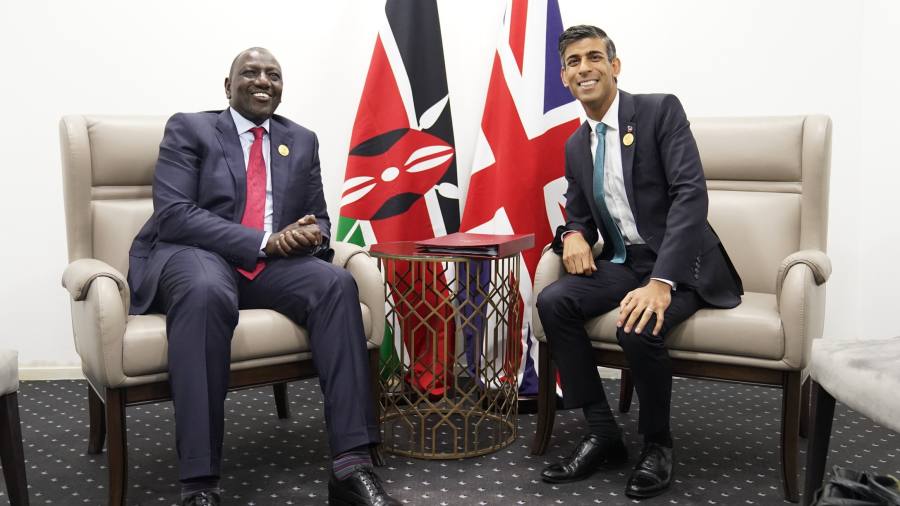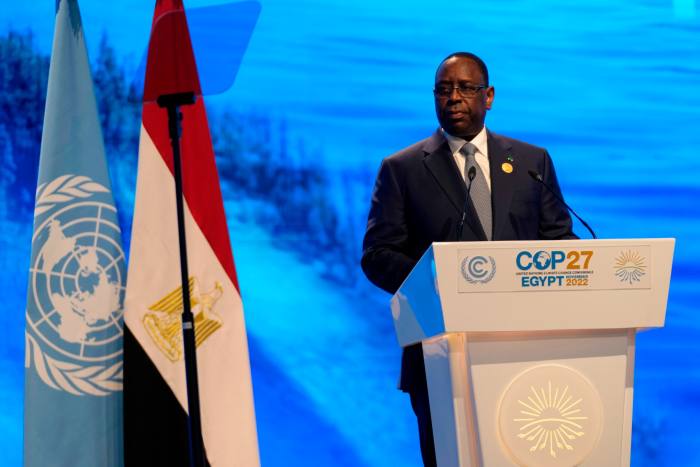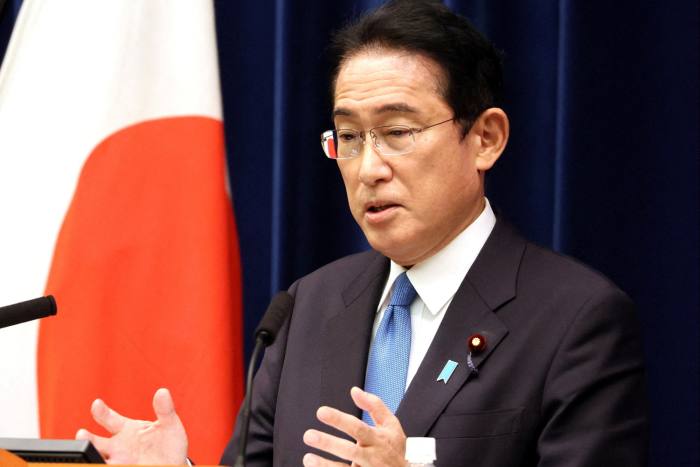
This article is an on-site version of our Moral Money newsletter. Sign up here to get the newsletter sent straight to your inbox.
Visit our Moral Money hub for all the latest ESG news, opinion and analysis from around the FT
Welcome back to the second of our special COP27 editions. We’ll be reporting from Sharm el-Sheikh every weekday for the duration of the conference.
When it comes to the UK’s reputation on climate action, it seems the country ousted Liz Truss just in time. Its shortest-serving prime minister made no secret of her distaste for the green agenda, promising to ramp up oil and gas production, kick-start fracking and restrict solar development — and, of course, banning King Charles III from attending COP27.
Rishi Sunak did his climate credentials no favours by saying initially that he’d sit the summit out — a move that would have been very damaging to the green national brand the UK nurtured around last year’s COP26 in Glasgow. After a domestic outcry, Sunak reversed course — and, as I write below, delivered a speech that served as an implicit rebuke to the Trussite, fossil fuel-boosting wing of his party.
That was part of a day of national leaders’ speeches that has set the tone for everything else happening here over the next 10 days. We’ll have to wait until later in the week for the appearance of Joe Biden, who has been detained in the US by the small matter of today’s midterm congressional elections. The outcome of these will have powerful implications for the energy transition in the US and beyond — you’ll find our take on the early results tomorrow. (Simon Mundy)
COP27 day 2 in brief:
-
UN secretary-general António Guterres warned delegates that they were “on a highway to climate hell”, while former US vice-president Al Gore urged nations to “stop subsiding the culture of death” of fossil fuels.
-
The World Health Organization said that about 15,000 deaths could be attributed to this summer’s heatwaves in Europe — an announcement that will add to pressure on European delegates for serious action at COP27.
-
Greta Thunberg said she’s ready “to hand over the megaphone” to people who are most affected by the climate crisis. The Swedish activist, who is not attending COP27, also voiced disgust at “things world leaders and heads of state have said when the microphone is off”.
The key takeaways from yesterday’s speeches
In the run-up to COP27, I found myself anticipating — and quietly hoping for — a markedly more assertive approach from the developing nations that have borne the brunt of climate change amid repeated broken promises of assistance from rich countries.
Judging by yesterday’s statements, a good number of Global South leaders have run out of patience — and are no longer making much effort to be polite about it.
The focus yesterday at COP27 was a series of speeches by national leaders, setting out the positions from which their delegates will negotiate in the coming days.
At this African COP, some of the most powerful interventions were made by leaders from that continent against a backdrop of devastating drought in its east and deadly floods in the west and centre.
“Africans should not pay for crimes they have not committed,” said Faustin-Archange Touadéra, president of the Central African Republic — which, like other countries in its region, has suffered severe flooding this year. “We should say clearly the rich countries — the top polluters — are the ones who are most to blame for endangering humanity.”
Another strongly worded address came from Kenyan president William Ruto, who attacked the “cruel and unjust . . . stalling, delaying tactics and procrastination” undertaken by rich countries at previous COPs. He went on to condemn their “egregious and unexplained default” on promises of climate assistance — deploying the language of delinquent debt that has been used so often in relation to struggling African economies.

The most glaring example of the failure he described is the promise made by developed countries, at the Copenhagen climate summit in 2009, to mobilise $100bn of annual climate assistance for developing nations by 2020. Two years on, they remain well short of meeting that promise. Macky Sall, president of Senegal and chair of the African Union, said it was time for the rich nations that bear disproportionate blame for the climate crisis not just to meet that pledge, but to double it to $200bn.
At the same time, however, Sall stressed that African nations would not tolerate “decisions that jeopardise our development”. This reflected concerns that the global push to phase out fossil fuels could slow Africa’s energy expansion, as expertly covered by our colleague David Pilling.
Fears about energy security have gone global this year amid the turmoil sparked by Russia’s invasion of Ukraine. Some politicians have seized the moment to call for a slow-pedalling on the energy transition, or (see above) an expansion of domestic fossil fuel production. This may have emboldened Mohammed bin Zayed al-Nahyan, president of the United Arab Emirates, to make a rather defiant-sounding contribution to proceedings, pledging that the UAE would continue pumping out oil and gas “for as long as the world is in need”.
But it was striking to see the leaders of Europe’s biggest economies, in a move that may or may not have been co-ordinated, dismiss the idea that the absent Russian president Vladimir Putin will slow down the energy transition.
“We will not sacrifice our commitments to the climate due to the Russian threat,” France’s Emmanuel Macron vowed. Germany’s Olaf Scholz urged: “There must not be a worldwide renaissance of fossil fuels . . . And for Germany I can say: there will not be one.” The UK’s Rishi Sunak, in marked contrast with his shortlived predecessor, said that Putin’s war and consequent rising energy prices “are not a reason to go slow on climate change. They are a reason to act faster”.
Bold words all round then. But the real action — including, almost certainly, some fiery disagreements — will happen in the coming days, after the government leaders have left the stage. (Simon Mundy)
Quote of the day
“How do companies make $200bn in profits in the last three months and not expect to contribute at least 10 cents in every dollar of profit to a loss and damage fund. This is what our people expect.”
Mia Mottley, prime minister of Barbados, urged oil and gas companies to use part of their soaring profits to assist countries hit by climate disasters.
Beyond COP27: Japan scraps new carbon tax, focuses on green bonds

Surging energy costs this year have torpedoed another climate initiative — this time in Japan. Prime minister Fumio Kishida’s government has scrapped a carbon emissions surcharge that was expected to be in the fiscal 2023 tax reform package, our colleagues at Nikkei have reported. The government feared another tax on businesses and consumers would be too painful in this economic environment.
“Raising taxes that will immediately increase the burden will not be an option,” a source from the ruling coalition told Nikkei.
Instead, Japan is planning to issue $136bn of green bonds financed with funds from a carbon-pricing programme.
Japan already has a tax for climate change mitigation, started in 2012. Also, Kishida has announced a plan to deploy ¥150tn ($1.1tn) over the next decade to hit Japan’s net zero emissions 2050 target with an interim goal of reducing greenhouse gas emissions by 46 per cent by 2030.
By scrapping the emissions surcharge, Kishida is putting a lot of hope for cutting carbon on Japan’s green bonds. Though the green bond market has stayed afloat this year, interest rates continue to rise globally, and it remains to be seen how willing the market will be to gobble up a green deal of this size. (Tamami Shimizuishi, Nikkei, and Patrick Temple-West)
Smart read
Putin’s war in Ukraine has shifted the green energy transition into a national security concern. The FT’s editorial board has urged wealthy nations to “go much further” at COP27 in pledging funds to fight global warming.
Recommended newsletters for you
Due Diligence — Top stories from the world of corporate finance. Sign up here
Energy Source — Essential energy news, analysis and insider intelligence. Sign up here